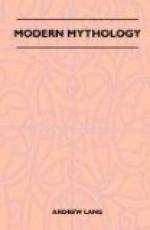I trust that I have imputed no unfairness, made no charge of conscious misrepresentation (to accidents of exposition we are all liable), have struck no foul blow, hazarded no discourteous phrase. If I have done so, I am thereby, even more than in my smattering of unscholarly learning, an opponent more absolutely unworthy of the Right Hon. Professor than I would fain believe myself.
APPENDIX A: The Fire-walk in Spain
One study occasionally illustrates another. In examining the history of the Earl Marischal, who was exiled after the rising of 1715, I found, in a letter of a correspondent of d’Alembert, that the Earl met a form of the fire-walk in Spain. There then existed in the Peninsula a hereditary class of men who, by dint of ‘charms’ permitted by the Inquisition, could enter fire unharmed. The Earl Marischal said that he would believe in their powers if he were allowed first to light the fire, and then to look on. But the fire-walkers would not gratify him, as not knowing what kind of fire a heretic might kindle.
APPENDIX B: Mr. Macdonell on Vedic Mythology
Too late for use here came Vedic Mythology, from Grundriss der indo-arischen Philologie, {201} by Mr. A. Macdonell, the representative of the historic house of Lochgarry. This even a non-scholar can perceive to be a most careful and learned work. As to philological ‘equations’ between names of Greek and Vedic gods, Mr. Macdonell writes: ’Dyaus=[Greek] is the only one which can be said to be beyond the range of doubt.’ As to the connection of Prometheus with Sanskrit Pramantha, he says: ’[Greek] has every appearance of being a purely Greek formation, while the Indian verb math, to twirl, is found compounded only with nis, never with pra, to express the art of producing fire by friction.’ (See above, p. 194.) If Mr. Macdonell is right here, the Greek myth of the fire-stealer cannot have arisen from ‘a disease of language.’ But scholars must be left to reconcile this last typical example of their ceaseless differences in the matter of etymology of names.
FOOTNOTES
{0a} Chips, iv. 62.
{0b} Chips, iv. p. xxxv.
{0c} Chips, iv. pp. vi. vii.
{0d} Ibid. iv. p. xv.
{0e} Cults of the Greek States, ii. 435-440.
{0f} Chips, iv. p. xiv.




